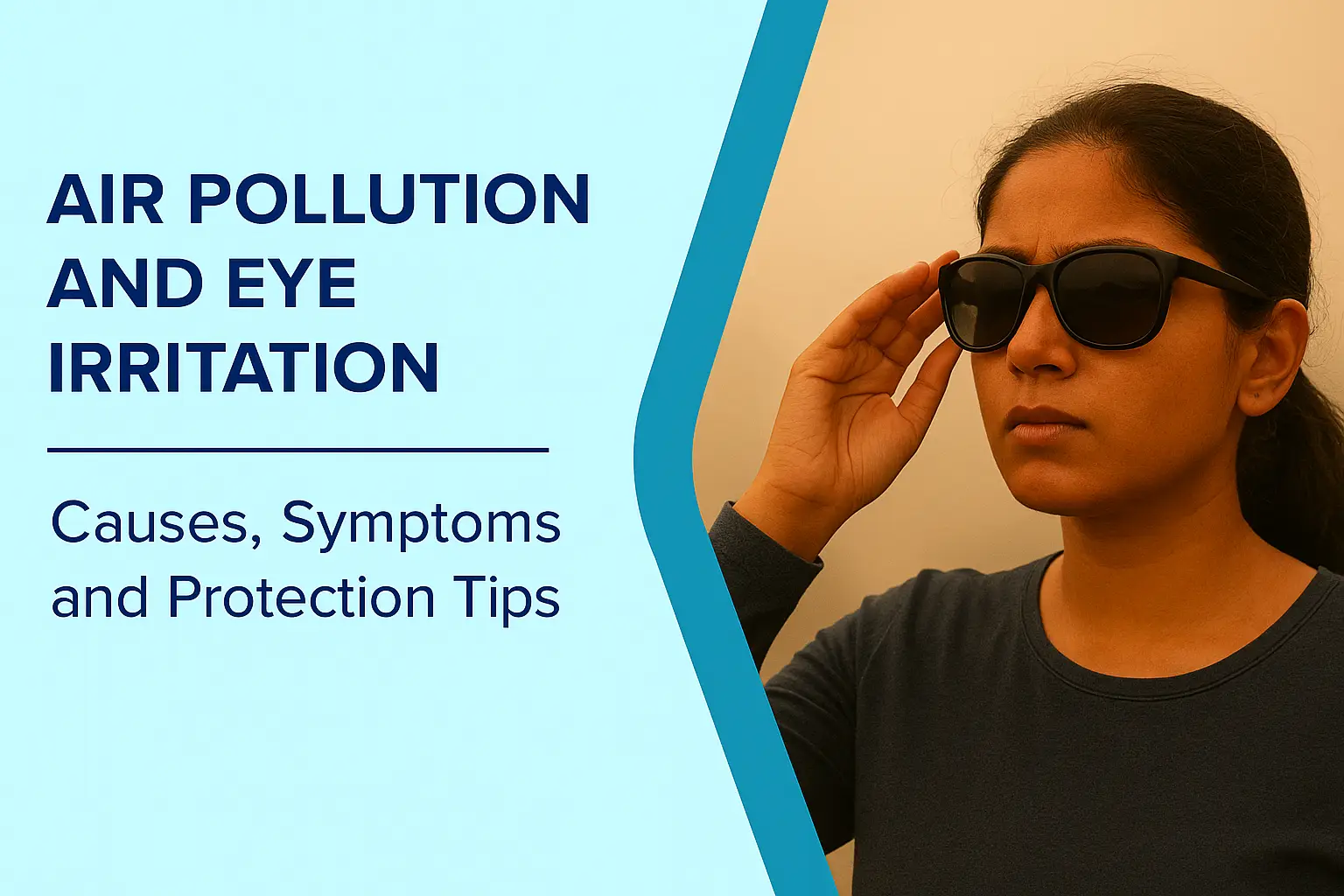
Air pollution is one of the most serious health challenges in India today. From smog-filled city skylines to dusty rural roads, the tiny particles in the air don’t just affect your lungs — they can also irritate and damage your eyes. With rising pollution levels, understanding how poor air quality impacts eye health has become more important than ever.
The Link Between Air Pollution and Eye Irritation
Our eyes are extremely sensitive organs that constantly stay exposed to the environment. When the air is filled with harmful pollutants like dust, smoke, vehicle emissions, and industrial particles, these irritants come directly in contact with the eye surface. Polluted air contains fine particulate matter (PM2.5 and PM10), ozone, nitrogen dioxide, and sulfur dioxide — all of which can trigger inflammation and dryness in the eyes.
Even short exposure to polluted air can cause mild irritation, while long-term exposure increases the risk of chronic eye conditions. People living in urban areas or those who commute daily are especially at risk.
Common Eye Problems Caused by Air Pollution
1. Dry Eyes:
Polluted air often lacks humidity and contains harmful chemicals that strip away the natural moisture of the eyes. This leads to itching, burning, redness, and a gritty feeling — a condition known as Dry Eye Syndrome.
2. Allergic Conjunctivitis:
Fine dust, smoke, and pollen particles can trigger allergic reactions, leading to swelling, redness, and watering of the eyes. This condition is common during peak pollution and seasonal changes.
3. Eye Fatigue and Blurred Vision:
Long exposure to irritants and continuous blinking to protect the eyes can cause strain and blurred vision, especially for those who work outdoors or in traffic.
4. Watery Eyes and Burning Sensation:
As a defense mechanism, your eyes may produce excess tears to wash away pollutants, causing watering and discomfort.
5. Increased Risk of Infections:
Pollutants weaken the tear film — the natural barrier that protects the eye surface — making it easier for bacteria and viruses to cause infections.
Who Is More at Risk?
While anyone can be affected, some groups are more vulnerable:
- Children and the elderly with weaker immune systems
- Outdoor workers such as traffic police, delivery agents, and construction workers
- Contact lens users, since lenses can trap pollutants close to the eye
- People with pre-existing eye or respiratory problems
How to Protect Your Eyes from Air Pollution
1. Wear Protective Eyewear:
Sunglasses or clear wraparound glasses help reduce direct exposure to dust and smoke.
2. Keep Eyes Hydrated:
Use lubricating eye drops or artificial tears to maintain moisture and comfort.
3. Maintain Good Hygiene:
Wash your hands and face frequently, especially after being outdoors. Avoid rubbing your eyes, as it can transfer pollutants and germs.
4. Limit Outdoor Activities During Peak Pollution Hours:
Avoid early mornings and late evenings when smog levels are high.
5. Stay Indoors on Smoggy Days:
Use air purifiers at home and keep windows closed when pollution levels rise.
6. Eat Eye-Friendly Foods:
Include foods rich in vitamins A, C, and E — such as carrots, spinach, citrus fruits, and almonds — to strengthen your eyes from within.
7. Regular Eye Checkups:
Visiting an eye specialist once or twice a year can help detect early signs of damage and prevent complications.
8. The Bigger Picture: Clean Air, Clear Vision
Protecting your eyes from pollution isn’t just about drops or glasses — it’s about creating a cleaner environment. Reducing vehicle emissions, planting trees, and using public transport are small steps that contribute to cleaner air and better eye health for everyone.
Final Thoughts
Your eyes are among the most exposed and delicate parts of your body. In a country where air pollution has become an everyday reality, taking proactive care of your eyes is not optional — it’s essential. Simple preventive habits, regular care, and awareness can go a long way in keeping your vision clear and your eyes healthy. Flixblit, an informative blogging site, aims to spread awareness and share simple health insights that help you protect your wellbeing every day.
Frequently Asked Questions (FAQs)
1. How does air pollution affect the eyes?
Air pollution contains fine particulate matter (PM2.5, PM10), smoke, and toxic gases that can irritate the delicate tissues of your eyes. These pollutants damage the tear film — the thin layer that keeps eyes moist — leading to dryness, itching, and redness. Prolonged exposure can even worsen allergies or trigger chronic dry eye syndrome.
2. Can air pollution cause burning or watery eyes?
Yes. Polluted air often carries irritants like ozone and sulfur dioxide that react with the eyes’ surface. As a defense mechanism, your eyes produce excess tears to flush out particles, resulting in burning, watering, or a gritty sensation. People living in metro cities like Delhi or Mumbai are more prone to these symptoms, especially during winter smog season.
3. Is eye redness from air pollution temporary?
In most cases, redness and irritation subside once exposure ends or after using lubricating drops. However, continuous exposure can lead to inflammation of the conjunctiva (the clear membrane covering the eye), causing recurring redness and sensitivity. Regular eye checkups are advisable if you face persistent discomfort.
4. What can I do daily to protect my eyes from polluted air?
Simple habits can make a big difference:
- Wear protective eyewear like wraparound sunglasses when outdoors.
- Use artificial tears to keep eyes hydrated and wash away irritants.
- Avoid touching or rubbing your eyes, especially after being outside.
- Stay indoors during peak smog hours (early morning or late night).
- Add indoor plants like aloe vera and peace lily to improve indoor air quality.
5. Are lubricating eye drops safe for regular use?
Yes, preservative-free lubricating eye drops or artificial tears are generally safe for daily use. They help keep eyes moist and reduce irritation. However, if symptoms like persistent redness, pain, or blurred vision continue, it’s best to consult an eye specialist before long-term use.